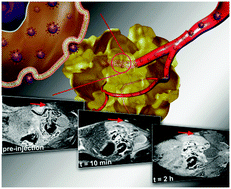Highly sensitive MRI contrast agent for enhanced visualization of tumors†
Abstract
Compared with other medical imaging techniques, magnetic resonance imaging (MRI) has an obvious disadvantage of low sensitivity, in other words, the injection dosage of the probe (contrast agent) is very high. In this paper, we developed c(RGDyK)-conjugated KMnF3 nanocubes as a tumor targeting T1 contrast agent. The short cyclic peptide (c(RGDyK)) was conjugated with carboxylic terminated KMnF3 nanoparticles via 1-ethyl-3-(3-dimethylaminopropyl)-carbodiimide (EDC) coupling. The nanoparticles have an appropriate hydrodynamic size and narrow size distribution. Furthermore, they showed high in vitro bio-stability and biocompatibility. Application of the c(RGDyK)-conjugated nanoparticles for in vivo MR imaging of tumors profoundly enhanced the image contrast to almost double. More importantly, the injection dosage required is one to two orders lower than that of a commercial or reported contrast agent. The c(RGDyK) short peptide was proven to play a targeting role, and c(RGDyK)-conjugated KMnF3 nanoparticles have a potential application for the diagnosis of tumors.


 Please wait while we load your content...
Please wait while we load your content...